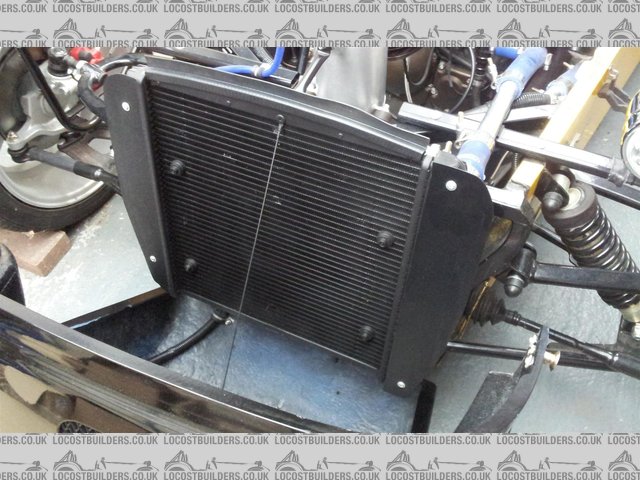

Description

i've concluded that the great hole in the nose of my indy is wasted as all the air seems to decide to miss the radiator and go around the sides
of it so i've decided it's time to make a shroud of some sort so the air has to pass through the radiator but i'm not sure how to go
about it.
one thought i have is expandable foam the inside of the nose cone and then cut away to the radiator so it's got something of a smooth flow into
the radiator rather than hitting a wall of a shroud and potentially creating a lot of pressure insde the nosecone before the air decides to make it
way through.
any thoughts on this or tips as to how you have done it?
many thanks.
john
A square duct made from thin aluminium is the usual solution, very light.
I went for the aluminium surround around the radiator as mentioned.
Used 3mm aluminium sheet cut to size (used cardboard to make template first off) to fit within the nose cone.
I then used boot/door seal around the cut aluminium sheet so that it would make a good seal within the nose cone without the need for my aluminium to
fit absolutely perfectly.
The boot seal was from CBS: CBS boot/door seal
Although, when I say "I" in this post, what I mean is with the help of adithorp.
Found 1.5mm ally could be cut to within 2-3 mm of sides and top sealed with boot seal.


Description
Getting air TO the rad is only half the problem.
You need a good exit. If you do this then you may not need to do anything else at the front.
Perhaps a mesh panel in your bonnet to allow the air to escape?
Mine
intercooler
Liking the idea of expanding foam to stop air running around the outside
[Edited on 8/5/13 by mark chandler]
I recall this being discussed before....
yes... indeed, some info here maybe?
http://locostbuilders.co.uk/forum/4/viewthread.php?tid=165858
and here:
http://locostbuilders.co.uk/viewthread.php?tid=157200
http://locostbuilders.co.uk/viewthread.php?tid=91132
http://locostbuilders.co.uk/viewthread.php?tid=141921
[Edited on 8-5-13 by loggyboy]
I have used some 2mm thick rubber sheet to mask off the area around the rad. Cut to the rough shape and it moulds itself tight up to the nosecone.
Air exit is just as important. It doesn't matter how big the hole is at the front, if air can't get out after the rad then it's
useless!
i'm ready to be convinced that bonnet venting is a good idea but am yet to head a convincing argument. Tintops have good front airflow into the rad but very little if any venting behind.
My car has a flat bottom with a little hole that the sump drops into, t speed the rear of the bonnet started to lift with air pressure with lots of
Lourves cut into it so I then drill lots of 2" holes along the side to let air out.
In a car it is pressed out under the car, lots of big gaps effectively then pushing it off the ground
It can be quite surprising which areas of a car are in low pressure zones when the car is moving.
On most cars the entire underside of the car is a low pressure zone. On rear engined Hillman Imp the fan drew air forwards from from the engine bay
through the rad and out through the bottom of the car just behind the nearside rear wheel.
On front engined RWD cars a surprisingly large volume of air get drawn down the transmission tunnel.
On tintops the wheel arches are low pressure so a lot of air gets drawn out from the engine bay via the wheel arch, on the BL Mini the fan actually
blew from the engine bay through the radiator in to the wheel arch.
[Edited on 9/5/13 by britishtrident]